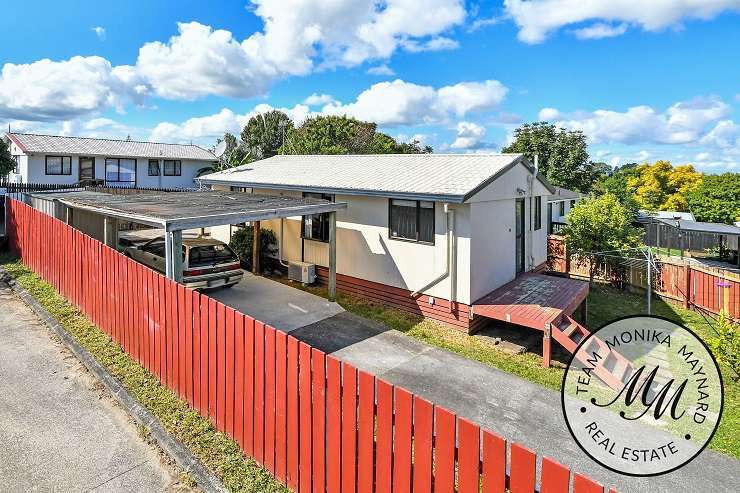More choice and cheaper prices are giving house buyers the upper hand – but economists say the biggest winners are those looking to own their first home.
Opes Partners resident economist Ed McKnight said all signs pointed to it being a buyer’s market.
“If you weigh it up, supply is much bigger than demand right now. Sellers want to make deals, buyers they are sitting on their hands a bit so it’s definitely a buyer’s market.”
But McKnight said that did not necessarily mean everyone should be buying right now and it would come down to individual circumstances.
Start your property search
Discover more:
- ‘Oh s***! I can’t do that’: Lots of choice, but money woes are thwarting buyer plans
- Award-winning broker’s top tips: I was 24, earning $35,000 a year and bought my first home
- Tony Alexander: Tear up the rulebook on mortgage rates - volatility is here to stay
First-home buyers could benefit from the increase in choice and decrease in house prices, he said, but it might not make sense for investors because the high interest rates meant very few rental properties were cashflow positive so would require top-ups.
However, increased number of homes being marketed with an advertised price, by negotiation or with a buyer enquiry over a certain price worked in favour of first-home buyers because they could make conditional offers, he said.
McKnight said a lot of first-home buyers avoided auctions because they didn’t want to shell out hundreds of dollars getting building reports and valuations only to be outbid so they were making the most of the current market.
“We are seeing a very high percentage of first-home buyers purchasing properties at the moment.”

Opes Partners resident economist Ed McKnight says all signs point to it definitely being a buyer's market right now. Photo / Fiona Goodall
Likewise, movers looking to upgrade could benefit from the fact house prices have fallen in the last few years, he said, but those looking to downgrade might want to wait until it was a seller’s market.
CoreLogic chief property economist Kelvin Davidson said it wasn’t only about the financials for owner-occupiers, but many other factors including the house and location.
“In some cases you can say it’s always a good time to buy if you aren’t taking into account those monetary things which are quite hard to put a value on.”
CoreLogic data showed first-home buyers continued to be successful in the current market and represented a record 26% of all buyers. The properties were also cheaper and were on average 11% cheaper than at the peak of the market.
Davidson said the drop in house prices meant their deposit went further or it was easier to save for a deposit, not buy.
Ray White Manukau co-owner Tom Rawson said it was easier for first-home buyers getting into the market because they had less competition and they could pick up the same entry-level house for about $200,000 less now than they would have over two years ago.
A three-bedroom, one-bathroom home at 21A Nearco Street in Randwick Park sold under the hammer this week for $555,500, while a do-up at 1/6 Wayne Drive, in Mangere fetched $665,000.
At the peak of the market at the end of 2021 they would have both fetched more than $700,000, Rawson said.
“Because we’ve had increased supply with consistent demand, that means there’s more properties to choose from with the same amount of competition spread across all properties.”

A three-bedroom property on Nearco Street, in Randwick Park, Manukau, sold for $555,000 at auction, but would have fetched about $700,000 two years ago. Photo / Supplied
The reduced demand for each property also meant sellers were more willing to consider a conditional deal, which gave first-home buyers time to carry out their due diligence and get their finances approved.
“First-home buyers are the most scaredy-cats of people – quite cautious as such. But there’s not too many people predicting property prices are going to go down for where they are at now – most are predicting they are going to go up.”
Kiwi Mortgages mortgage adviser Jatinder Singh agreed it was a good time for first-home buyers to get on the property ladder. Applying for lending was also quicker and easier compared to a year ago.
Singh said first-home buyers were finding it easier to get finance as banks were no longer looking at how many coffees were being bought, and the biggest challenge now impacting their borrowing was the huge hike in insurance premiums.
Those buying now should fix their mortgage at the current higher interest rates for between one year and two years and then wait for the market to change and interest rates to go down, he said.
“First-home buyers actually have a lot of options available and they are more choosy. They are saying no to a lot of properties, they are saying no to the auctions, they are taking their time basically. They are not in a hurry to buy it.
“They are making offers with conditions such as finance conditions, building conditions and then they are going ahead. They are doing a lot of negotiations as well and a lot of vendors who are selling their properties are actually agreeing to the buyers’ conditions.”
Under the current conditions, Singh said it was easier for first-home buyers to purchase than investors who when faced with the Reserve Bank’s proposed new debt-to-oncome ratio restrictions would find themselves able to borrow a lot less than what they previously could.
- Click here to find more properties for sale











































































